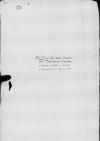Letter #2134
Ioannes DANTISCUS to Tiedemann GIESEHeilsberg (Lidzbark Warmiński), 1539-04-14
English register:
True to Dantiscus’ earlier predictions, their fellow countrymen [the Gdańsk (Danzig) Town Council] has got into trouble, so he has advised them to refrain from responding to the latest royal mandate to the [Royal Prussian] Diet.
He has also informed them that due to the plague in Marienburg (Malbork), the King [Sigismund I Jagiellon] needs to be asked to move the session’s time and place. He wants to know Giese’s opinion on this quickly. He is prepared to send a messenger to the court if the others do not want to incur the cost. He has also defended the new [royal] chancellery before [the Gdańsk Town Council], who were complaining about it.
He sends Giese a letter from Dietrich [von Reden] from Rome (requesting its return as the opportunity arises), regarding among other things 400 ducats of the inheritance from [Mauritius Ferber].
He reports indignantly that Alexander [Sculteti’s] mistress (Alexandrina) is close to giving birth again and is still in Frauenburg (Frombork) (apud communem ecclesiam nostram), with no concern – as the daughter of a convert and the mistress of an atheist – for the aggravation. That is why Dantiscus has sent out a reaggravation and intends to finally settle the matter. He asks Giese to support his actions in this with a letter to the [Ermland (Warmia)] Chapter.
Manuscript sources:
Auxiliary sources:
Prints:
| ||||||||
Text & apparatus & commentaryPlain textText & commentaryText & apparatus
Reverendissimo in Christo Patri, domino, domino
Reverendissime in Christo Pater et Domine, frater et amice carissime et honorande .
Salutem et fraternum amorem.
Quemadmodum superioribus diebus Dominationi Vestrae Reverendissimae cf.
cf.
Accepi heri cf.
Quae diu feliciter et prosperrime valeat.
Ex
Reverendissimae Dominationis Vestrae frater integerrimus
[1 ] communis ecclesia nostra means here the cathedral church in

